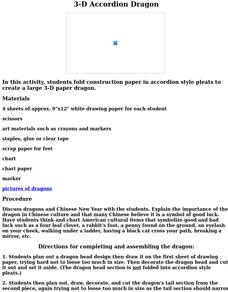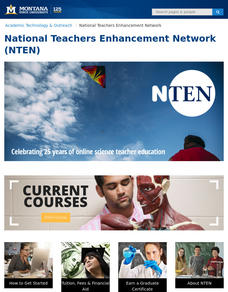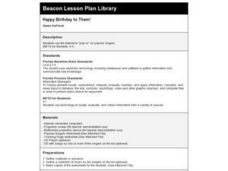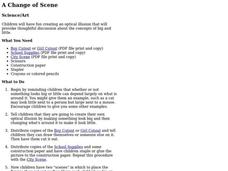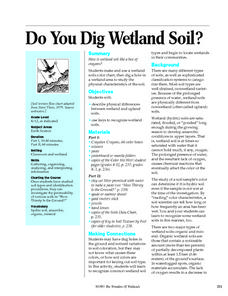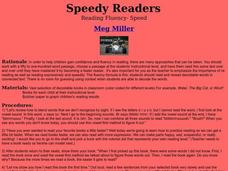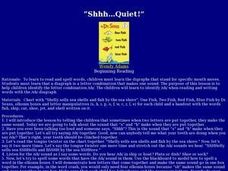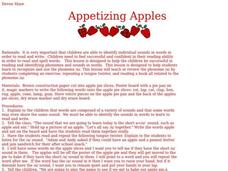Curated OER
Worm Composting: Vermiculture
Students compost in a limited space and describe the decomposing process. Students convert unwanted, organic matter, particularly food scraps and paper into fertile soil.
Curated OER
3-D Accordion Dragon
Students fold construction paper in accordion style pleats to create a large 3-D paper dragon.
Curated OER
The Effect of Moisture on Soil Temperature
Students analyze the relationship between soil moisture and its effect on soil temperature.
Curated OER
Flora and Fauna as Figures of Speech
Students view artwork in manuscript pages depicting insects, animals, plants, flowers, and ornate writing, such as those found in the Mira calligraphiae monumenta in the Getty Museum.
Curated OER
This Lesson is Totally Trippy Man
Third graders interview parents, friends and neighbors to find examples of slang terminology from previous decades. They write slang words and their definitions and chart current and previous appropriate slang on a poster.
Curated OER
Happy Birthday to Them!
Third graders use a search engine to search the Internet and find the birthdates of the singers listed on the Popular Singers Worksheet. They provide the URL address from which they obtain their information for each singer.
Curated OER
Picture Your Numbers
Learners play a variation of the Concentration game to practice math skills matching numbers with visual pictures. They have 20 cards, ten with pictures of items drawn on them. They other ten are numbered. They try to match correct pairs.
Curated OER
Animals: Bobcats
Students examine the bobcat and its habitat. They color pages and examine photographs and fact sheets to explore the bobcat.
Curated OER
Spring Fever
Students grow plants from seeds that can later be placed in outdoor settings. They care for the seeds while they germinate and begin to leaf out.
Curated OER
Counseling
Students, as a group, read a story about being kind and giving to others. They answer questions about the story and discuss it. They are also asked if it is better to have a lot of stuff or to enjoy it.
Curated OER
March Market
Students role play a living wetland food web. They trace the food web associated with the items in their lunch.
Curated OER
A Change of Scene
Students create their own optical illusions by making something look big and then changing what's around it to make it look little.
Curated OER
Do You Dig Wetland Soil?
Students study the physical differences between wetland and upland soils. They match colors to the different levels of the soil after digging holes. They create soil color charts and chart the texture of the soils.
Curated OER
Animals in Japan
Students compare and contrast common animals children love and have as pets in Japan and America in this early elementary lesson. The culminating project is an original work of art by each student depicting an animal of their choice.
Curated OER
A Change of Scene
Students are challenged to create optical illusions using using cut-outs. The activity provokes thoughtful discussion about scale.
Curated OER
Dream! (Part One)
Students share with the class what they want to be when they grow up. As a class, they identify what they want to be for Halloween as well. They are videotaped stating their dream and photographed with their mask. Using the masks, they...
Curated OER
Which One Doesn't Belong?
Students listen to directions to find the word that doesn't belong in a group of words. They then receive a list of twenty words and choose the word that doesn't belong in the group independently.
Curated OER
Buzz, Buzz, Buzz
Students increase their reading fluency through the use of various strategies. After reviewing decoding and rereading, students complete an initial read of a novel text. Working with a partner, they read complete a timed assessment of...
Curated OER
Nemo's Fast Swim
Young scholars need to be come fluent readers and in order to do that they have to read faster, smoother and more expressively. They have to read accurate and automatic. Students gain fluency through repeated readings, timed readings,...
Curated OER
Speedy Readers
Student increase their reading fluency through the use of various strategies. After reviewing chunking, decoding, and rereading, students complete an initial read of a novel text. Working with a partner, they read complete a timed...
Curated OER
Get ready, get set? READ!!!
Pupils participate in reading exercises to improve speed, fluency, and comprehension. As a class, students practice reading skills to increase their speed and comprehension. Partners take turns competing in a reading race while reading...
Curated OER
Clerihew
Students explore how to create a Cherihew poem. They know that a Cherihew is a poem. Students write their own Cherihew poem. They are given examples of of a Cherihew. Students are shown that the poem has four lines and is often written...
Curated OER
Shhh! Quiet!
Students become aware that when certain letters are put together in a word they are said with a single mouth move. Through modeling and a variety of guided practice activities they explore the /sh/ phoneme. They read and identify 'sh'...
Curated OER
Appetizing Apples
Learners identify individual sounds in words in order to read and write. They explore ways to be successful in reading and identifying phonemes and sounds in words. Students recognize and use the phoneme a. They review the phoneme a by...
Other popular searches
- Millions of Cats
- Dogs & Cats
- Dogs and Cats
- Big Cats
- Saber Tooth Cats
- Cats the Musical
- Wild Cats
- Grade 3 Cats
- Cats Musical
- African Cats
- Bed Full of Cats
- Large Cats



